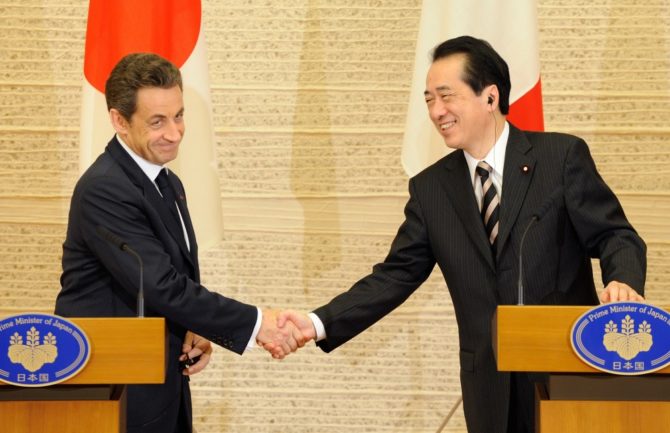The French-American Foundation Weekly Brief, April 1, 2011

French President Nicolas Sarkozy visited Japan on Thursday, March 31, to express his solidarity with the Asian nation following the earthquake and subsequent tsunami that devastated the nation on March 11 and to address the concerns following the power outage at the Fukushima Dai-ichi nuclear reactor, RFI reported. Following a trip to China to address issues related to France’s presidency of the G8 and G20, Sarkozy spent several hours in Tokyo, meeting with Japanese officials and calling for international nuclear security measures, according to Courrier International and BBC. Sarkozy proposed a meeting of nuclear industry officials from G20 nations in May to discuss the development of global rules on nuclear energy, according to Reuters. As French nuclear giant Areva announced intentions to step up its help in the cleanup efforts to remove radioactive material leaked from the Fukushima reactor on Thursday, March 31, Sarkozy confirmed France’s continued commitment to nuclear energy, which supplies about 80 percent of the nation’s energy, according to AFP and Le Parisien.
While in China for a meeting of G20 leaders, Nicolas Sarkozy joined others in pressuring China to welcome proposed reforms to the international monetary system, 20 Minutes reported. Sarkozy was among several leaders to promote a greater role for the Chinese Yuan, while stressing the importance of exchange-rate flexibility, according to the San Francisco Gate.
In the second round of regional elections, the Socialist Party gained 36.2 percent of votes to defeat a dwindling majority Union for a Popular Movement party (UMP) with 18.6 percent of votes and a rising far-right National Front with 11.6 percent, Rue 89 reported. With 55 percent of voters abstaining, the final results continue to show discontent with the current administration and uncertainty about the majority right party in the last election before the 2012 presidential elections. Socialist and left leaders called the elections a sign of opportunity to promote a successful campaign in 2012, according to 20 Minutes. However, the UMP party saw tensions within the party surface as voters turned away from President Sarkozy’s political movement, as explored by Le Monde. These elections also saw the rise of Marine Le Pen and her updated far-right National Front, as explored by the Guardian and AFP.
Budget Minister François Baroin announced on Tuesday, March 29, that the public deficit of France for 2010 was 7.2 percent of GDP, a half point lower than the expected figure of 7.7 percent, Les Echos reported. Baroin said the news was encouraging for France’s hopes of lowering its deficit-to-GDP ratio, moving in line with 3-percent limit set by the European Union. France’s deficit jumped from its 2008 3.3 percent-of-GDP level to a record 7.5 percent of GDP in 2009, according to Le Point. The French government has announced an intention to lower the deficit to 3 percent of GDP by 2013, according to AFP.
Religious leaders in France are voicing their opposition to plans for an April 5 political debate on the role of Islam in France by members of President Nicolas Sarkozy’s majority Union for a Popular Movement (UMP) political party (), La Tribune and the Seattle Times reported. The top representatives of France’s Catholics, Protestants, Orthodox Christians, Jews, Muslims and Buddhists signed an open letter published in La Croix warning politicians not to add to the confusion of the “troubled period” in which France finds itself.
The debate on religion and the feared perpetuation of bias toward France’s Muslim population has sparked concern among various politicians. Questions of religion played a role in local elections held this week, according to Reuters. Some politicians fear that members of France’s traditional right, Sarkozy’s UMP, have blurred lines with the emerging far-right, the National Front that nearly matched the UMP in voting results, as explored by le JDD. Prime Minister François Fillon, member of the UMP party, will not attend the April 5 debate, despite an invitation from the party’s secretary general Jean-François Copé, according to Le Point and Le Figaro. Despite Fillon’s absence, nine ministers from the UMP said they will be present at the debate, Le Figaro and Le Parisien reported.
Minister of Solidarities and Social Cohesion Roselyn Bachelot announced a law targeting the clients of prostitutes before the National Assembly on Wednesday, March 30, Le Parisien reported. In France, the solicitation of clients by prostitutes and the pandering of prostitutes are illegal acts, but no laws sanction the clients, according to Libération. Based on a Swedish law in effect since 1999, the law being proposed by Bachelot would fine the clients of prostitutes and carry a potential prison sentence up to six months, Boursier reported. Bachelot defended the law, defining prostitution as the usage of the female body for the desires of a male, claiming there was no such thing as “free, chosen, or consensual” prostitution, according to AFP.
François Hollande officially declared his candidacy on Thursday, March 31, for the Socialist primaries, to be held on July 13, making him the sixth candidate to announce an intention to take part in the primaries as polled favorite Dominique Strauss-Kahn and Socialist secretary general Martine Aubry’s intentions remain unannounced, according to Les Echos. Le JDD explored the likelihood of President Nicolas Sarkozy’s candidacy for reelection, which has not been officially announced but has been assumed. As Sarkozy’s popularity has seen record lows in recent history, speculation has risen about potential opponents within the UMP party.
Share to: Facebook Twitter LinkedIn Email



